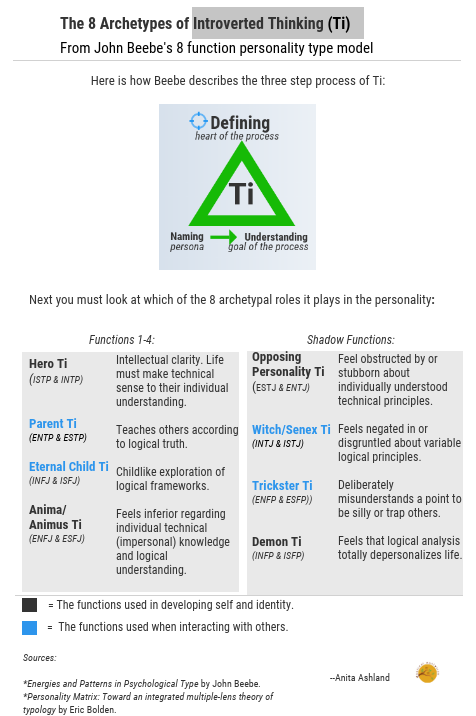Thinking gives clarity to the perceptions and decisions of the feeling function. It tends to be intellectual, impersonal, and analytical.
Thinking needs more information than feeling in order to make a judgement, so it tends to work more slowly than the feeling function.
John L. Giannini, who was a Jungian analyst, described the thinking function in general in this way:
Jung and Myers note that the thinking function lends itself to objectifying, systematizing, categorizing, naming, being logical, responding to ideas, seeking just treatment, observing hierarchies, being firm and tough-minded, being easily able to dismiss subordinates, enjoying policy-making and strategizing, seeking dignity and authority, and generally preferring to lead than follow.”
Compass of the Soul, p. 163
Now let’s take a look specifically at introverted thinking (Ti).
For starters, Carl Jung described introverted thinking as subjective:
This thinking is neither determined by objective data nor directed to them; it is a thinking starts from the subject and is directed to subjective ideas or subjective facts.
Psychological Types, para. 579
Ti trusts its own subjective ideas, its own conclusions, and its own judgments. When in analyzing mode it may appear cold, inflexible, and arbitrary. Ti likes to make things precise and helps the person organize their inner world.
Daryl Sharp, who was also a Jungian analyst, elaborates further on this subjectivity:
Lacking an orientation to outer facts, introverted thinking types easily get lost in a fantasy world. Their subjective orientation may seduce them into creating theories for their own sake, apparently based on reality, but actually tied to an inner image. In the extreme case this image becomes all-consuming and alienates them from others.
Personality Types: Jung’s Model of Typology, p. 71
Next, introverted thinking is about precision and clarity. Daryl Sharp again:
Since their thought process is logical and straightforward, they are especially good at filling in the gaps in the so-called nonlinear or lateral thinking—the leaping from thought to thought—that distinguishes the intuitive. As writers, their forte is not originality of content but rather clarity and precision in the organization and presentation of the available material.
Personality Types: Jung’s Model of Typology, p. 71
Finally, introverted thinking is Socratic in nature. Henry L. Thompson describes Ti in Jung’s Function-Attitudes Explained as: “A philosophical quest for the rational truth through the use of penetrating, systematic questioning and doubt. […] The objective of life is the constant seeking and questioning of truth and its ruling principles.”
Thompson also says that Ti may neglect or force-fit facts and can think it knows the real answers.
Below is the infographic I made that describes all 8 archetypal roles of Ti. All personality types have Ti and it behaves differently depending on where it is located. Half of the 16 personalities have it in the top four functions where it is m ore conscious. The other half have it in shadow.

These archetypes descriptions are just sketches and aren’t meant to be literal. The shadow functions in particular are highly qualitative. Our shadow is unconscious and the contents of each person’s shadow differ, of course.
The shadow functions are a guide for you to understand your complexes better. When you get “triggered,” and it is brought to your conscious attention (usually by another person or by you noticing your own physical reaction), you can try to trace it back to a shadow function and then reverse engineer it further to explore the origin of your complex.
Remember that no function ever acts separately from the other functions. Jung said we almost never see a pure form of a function. We consider a function only in order to better understand the whole of the personality.
This is part 7 of 8 in the series. Here are my other articles in this series:
The 8 archetypes of Introverted Feeling
The 8 archetypes of Extroverted Sensation (Se)
The 8 archetypes of Introverted Sensation (Si)
The 8 archetypes of Extroverted Intuition (Ne)
